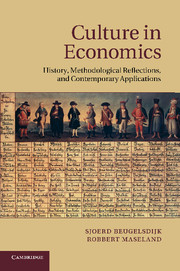Book contents
- Frontmatter
- Contents
- List of figures
- List of tables
- List of boxes
- Prologue
- Part I History and methodological reflections
- 1 Defining culture
- 2 How culture disappeared from economics
- 3 Explaining the rise of culture in modern economics
- 4 Culture in economics: contemporary theoretical perspectives
- 5 A methodological perspective on culture in economics
- Part II Contemporary applications
- Part III Evaluation
- References
- Index
2 - How culture disappeared from economics
Published online by Cambridge University Press: 04 February 2011
- Frontmatter
- Contents
- List of figures
- List of tables
- List of boxes
- Prologue
- Part I History and methodological reflections
- 1 Defining culture
- 2 How culture disappeared from economics
- 3 Explaining the rise of culture in modern economics
- 4 Culture in economics: contemporary theoretical perspectives
- 5 A methodological perspective on culture in economics
- Part II Contemporary applications
- Part III Evaluation
- References
- Index
Summary
Introduction
We have started our story about culture in economics with the difficult question what culture is and how to define it. We identified a number of essential aspects of what people understand by culture in the previous chapter. In this chapter and the next three, we delve into the question how this idea of culture may possibly enter economic thought.
Looking at the elements of culture that we have discussed, it is immediately obvious that such a task will not be easy. To economics, or at least the version of economics that became dominant in the twentieth century, culture is a very strange animal indeed. Economists tend to analyze behavior and society from the perspective of rational choice. Culture, meanwhile, is deemed inherited and given to individuals, lying outside the realm of instrumental design. Moreover, culture is about identities emerging at the level of collectives, whereas modern economics studies reality through the lens of individual decisions. Finally, the notion of cultures as constituting worldviews implies that there are various ways of perceiving reality, resulting in various logics of behavior. Economics, by contrast, aims to establish universal principles of behavior. These oppositions make it not very surprising that culture has not received much attention from economists until recently. Economics and culture are difficult to reconcile.
It was not always like that, however. The contemporary interest in the relation between culture and economics and how to include culture in economics is not something completely new.
- Type
- Chapter
- Information
- Culture in EconomicsHistory, Methodological Reflections and Contemporary Applications, pp. 15 - 59Publisher: Cambridge University PressPrint publication year: 2010



